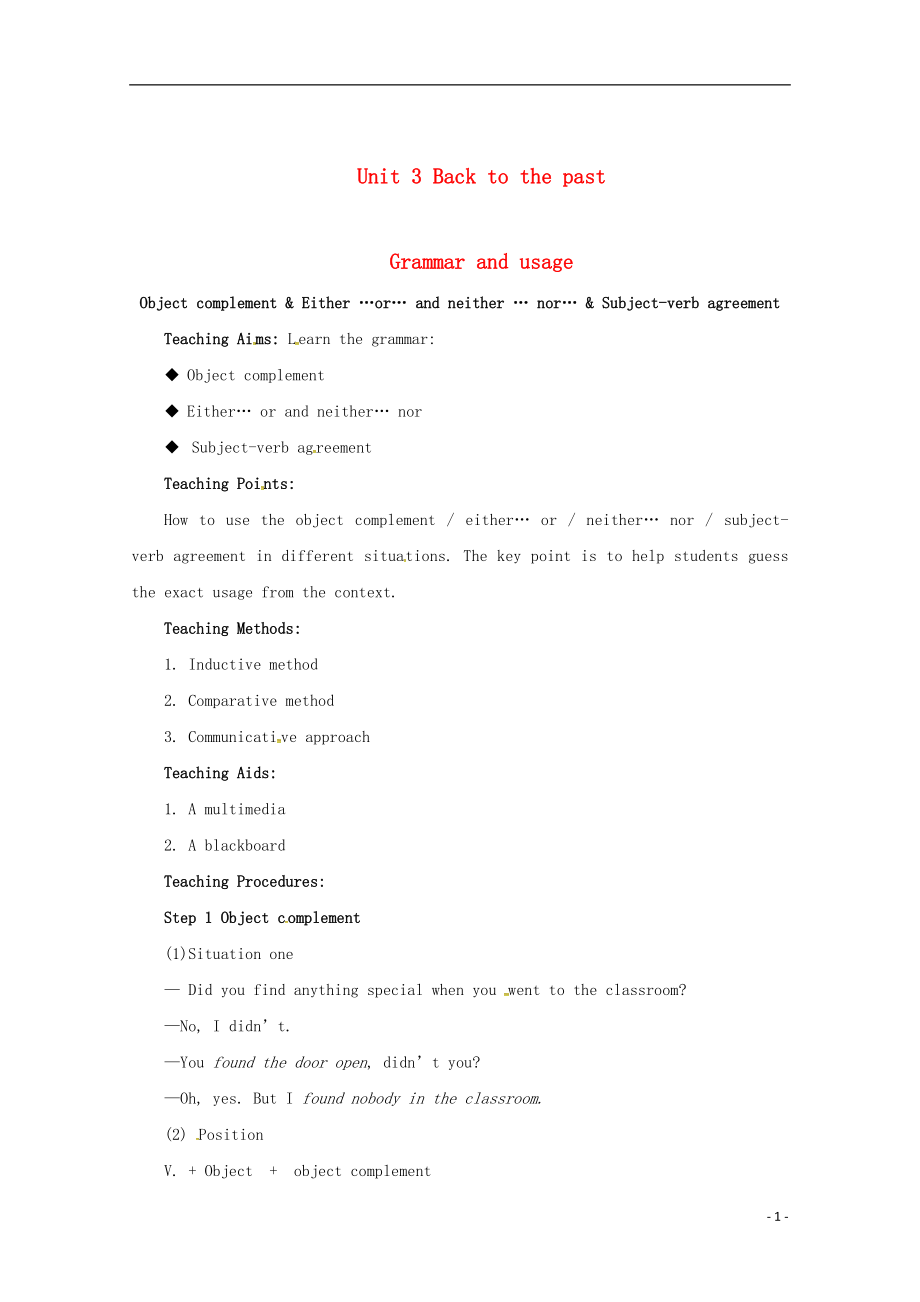《湖南省茶陵縣高中英語 Unit 3 Back to the past Grammar and usage教案 牛津譯林版必修3》由會(huì)員分享�,可在線閱讀,更多相關(guān)《湖南省茶陵縣高中英語 Unit 3 Back to the past Grammar and usage教案 牛津譯林版必修3(3頁珍藏版)》請(qǐng)?jiān)谘b配圖網(wǎng)上搜索��。
1、
Unit 3 Back to the past
Grammar and usage
Object complement & Either …or… and neither … nor… & Subject-verb agreement
Teaching Aims: Learn the grammar:
u Object complement
u Either… or and neither… nor
u Subject-verb agreement
Teaching Points:
How to use the object complement / either… or
2�、 / neither… nor / subject-verb agreement in different situations. The key point is to help students guess the exact usage from the context.
Teaching Methods:
1. Inductive method
2. Comparative method
3. Communicative approach
Teaching Aids:
1. A multimedia
2. A blackboard
Teaching Procedures
3、:
Step 1 Object complement
(1)Situation one
— Did you find anything special when you went to the classroom?
—No, I didn’t.
—You found the door open, didn’t you?
—Oh, yes. But I found nobody in the classroom.
(2) Position
V. + Object + object complement
e.g. The inspector shot the drug-d
4��、ealer dead.
(= The drug-dealer was shot dead by the inspector.)
(3)Situation two
—What do you think about her performance?
— We consider that her performance is a big success.
( We consider her performance a big success. )
—What do people think about dogs?
—People believe that dogs ar
5����、e honest.
( People believe dogs to be honest. )
(4)Usage
An object complement , which gives information about the object, can be a noun, a noun phrase, an adjective, a to-infinitive, a bare infinitive, or a prepositional phrase.
Step 2 Either… or / neither… nor
(1) Situation one
—I have got o
6、ne ticket for Liu Xiang’s 110m hurdle race to be held in Nanjing.
Either you or your desk-mate can have it.
—Is it on Saturday or on Sunday?
—It is on next Monday.
—Oh, what a pity. I am afraid neither I nor my desk-mate can enjoy it.
(2)Situation two
—Which language can I use to write
7����、the speech? ( English / Chinese )
—------ You can write the speech either in English or in Chinese.
(3) Situation three
—It is neither your fault nor mine. It’s your friend Jack’s fault.
—Whose fault is it? ( yours / mine )
(4)Situation four
—Which one can I take, Sir?
—I am afraid, you can t
8、ake _______________. (neither the gun nor the cigar)
(5)Situation five
—Where can I stay on Saturday afternoon, Sir?
—You can stay ______ in the classroom _____ in the dormitory. ( either … or)
Step 3 Subject-verb agreement
Grammar rules
Read the 6 points on Page 10, find out the usages of s
9��、ubject-verb agreement.
Step 4 Practice
When the subject is a group noun like: class/ family/ government/ team… , we use a singular verb if the noun identifies a singular or unit, or a plural verb if it identifies a number of individuals.
Step 5 Homework
Do the exercises in Workbook.
- 3 -
 湖南省茶陵縣高中英語 Unit 3 Back to the past Grammar and usage教案 牛津譯林版必修3
湖南省茶陵縣高中英語 Unit 3 Back to the past Grammar and usage教案 牛津譯林版必修3

